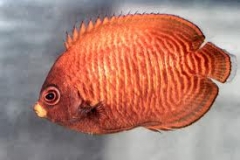Search the Community
Showing results for tags 'Golden Angelfish'.
-

Golden Angelfish ( Centropyge aurantia )
Harlequinmania posted a gallery image in Dwarf Angelfish (Centropyge)
Scientific Name : Centropyge aurantia Reef Compatible : With Caution Care Level : Expert-only Disposition : Semi-aggressive Min. Tank Size : 55 gallons Mature Size : 4 inches Diet : Omnivore Range : Indo-Pacific Species Description The Golden Angelfish was once a rarely seen fish in the industry but made popular by demand. Many of these specimens have a hard time acclimating to the bright lights of most home aquariums as these fish are collected from excessive depths. It is important to keep lighting dim during acclimation and slowly increase the intensity of light over several days to allow time for the fish to adjust. This can be tricky in a reef tank with coral so it is best to add the Angelfish before many of the photosynthetic corals go into the aquarium. The Golden Angelfish is not nearly as aggressive as other Centropyge Angelfish and will do much better with peaceful tank mates. It should be the only Angelfish in the tank unless you have a tank larger than 250 gallons and can provide plenty of hiding places. Like many other species of Centropyge Angelfish, it should only be added to an aquarium utilizing live rock for filtration or decoration. It is known for picking at soft and stony corals but most of the time this will not damage the coral. The fish is just being curious and not looking to make that expensive brain coral a meal. Golden Angelfish are one of the very few from the Centropyge genus that are collected as pairs. This is beneficial because it has been shown that pairs of these Angelfish will do exponentially better in captivity than individual specimens. Pairs do command a very high price but often it is worth it if you are a fan of this interesting little Angelfish. Diet Will readily accept most frozen and prepared foods. It is best to feed frozen mysis shrimp and spirulina algae if the Golden Angelfish is not kept in a well established aquarium.

